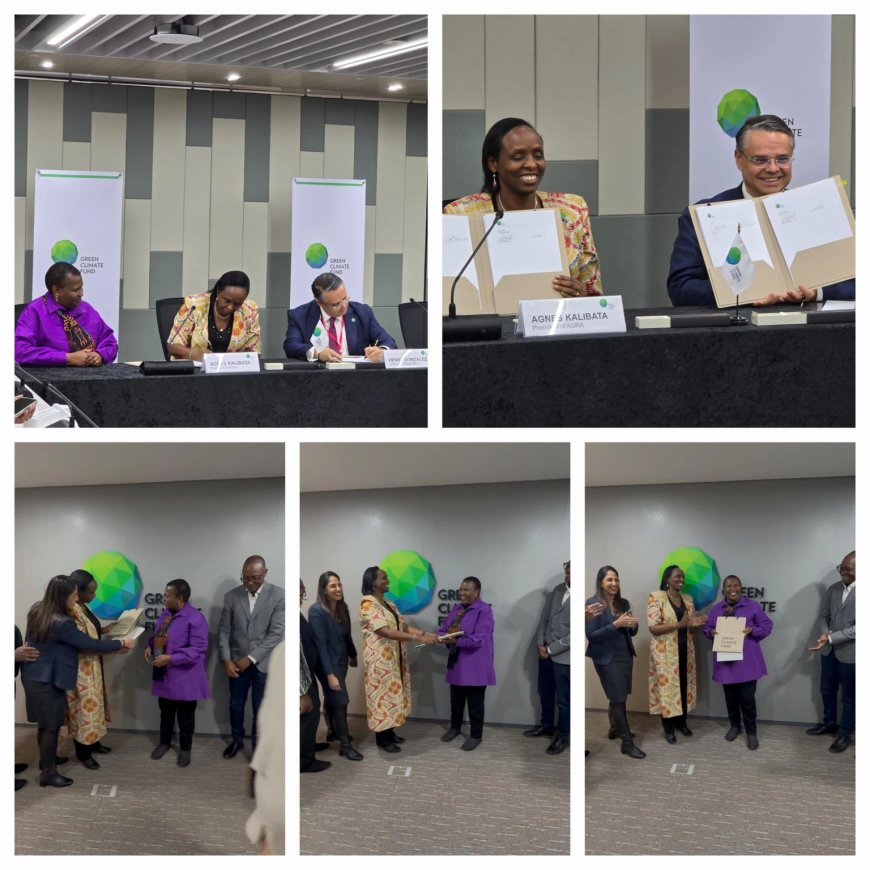$75 Million GCF Grant to Reduce Postharvest Losses in Africa: A Game-Changer for Climate Resilience and Food Security
A $75 million GCF grant has been signed to fund the RE-GAIN project, reducing postharvest losses in 7 African countries. Learn how this initiative will boost climate resilience and food security for smallholder farmers.

In a landmark moment for climate resilience and agricultural transformation in Africa, a $75 million grant from the Green Climate Fund (GCF) was officially signed yesterday. The grant will fund the Reduction of Postharvest Losses (RE-GAIN) project, a groundbreaking initiative to strengthen smallholder farmers' resilience to climate change across seven African countries. This project, the first of its kind, was approved in record time, thanks to the collaborative efforts of the GCF, AGRA (Alliance for a Green Revolution in Africa), and national partners.
The RE-GAIN Project: A Transformative Vision
The RE-GAIN project is designed to address one of Africa’s most pressing challenges: postharvest losses. In Sub-Saharan Africa, up to 30-40% of food produced is lost before it reaches consumers due to inadequate storage, transportation, and processing facilities. These losses not only exacerbate food insecurity but also contribute to economic and environmental challenges, particularly in the face of a rapidly changing climate.
The project will focus on promoting the wide-scale adoption of food loss reduction solutions (FL-RS) in seven countries: Burkina Faso, Ethiopia, Kenya, Malawi, Tanzania, Uganda, and Zambia. By engaging both the demand and supply sides, RE-GAIN aims to create sustainable markets for FL-RS, enhance affordability, and foster an enabling environment for their adoption.
Key Activities of the RE-GAIN Project.
Increasing Demand for FL-RS:
Encouraging smallholder farmers to adopt innovative solutions to reduce postharvest losses.
Raising awareness about the economic and environmental benefits of FL-RS.
Enhancing Supply and Affordability:
Supporting the development and distribution of affordable FL-RS technologies.
Partnering with the private sector to scale up production and accessibility.
Creating an Enabling Environment:
Strengthening policies and frameworks to support the adoption of FL-RS.
Building capacity among farmers, entrepreneurs, and policymakers.
A Collaborative Effort for Climate Resilience.
The RE-GAIN project is a shining example of what can be achieved through collaboration. The GCF’s Project Preparation Facility (PPF) played a crucial role in developing the project, while AGRA’s expertise and on-the-ground presence ensured its alignment with the needs of smallholder farmers. National Designated Authorities (NDAs) in the seven target countries also provided invaluable support, ensuring the project’s relevance and impact.
The project was approved under the GCF’s Project-Specific Assessment Approach (PSAA), an initiative designed to streamline access to climate finance for new partners, countries, and technologies. This approach allowed for a faster and more efficient approval process, ensuring that resources reach those who need them most.
A Moment of Gratitude and Transition.
The signing of the financing agreement marks a significant milestone in the journey toward climate resilience and food security in Africa. As the outgoing leader of this initiative, I am deeply grateful to the GCF CEO and her team, the GCF board, and the hardworking AGRA team for their unwavering commitment to this cause. Their dedication ensured that this project, which began two years ago at COP28, was brought to fruition in record time.
As I prepare to transition, I am proud to hand over the reins of this transformative project to Alice, AGRA’s incoming president, and the talented team that will lead its implementation. Together, they will ensure that the benefits of RE-GAIN reach the farmers who need them most.
Why This Matters.
Sub-Saharan Africa faces unprecedented challenges, including a rapidly growing population, climate change, and food insecurity. The effects of climate change are already severe, with rising temperatures, unpredictable rainfall, and extreme weather events threatening agricultural productivity.
By reducing postharvest losses, the RE-GAIN project will not only improve food security but also enhance farmers’ incomes, reduce greenhouse gas emissions, and contribute to a more sustainable and resilient food system.
A Call to Action.
The RE-GAIN project is a testament to what can be achieved when we work together to address the urgent challenges of our time. As we move forward, let us remain committed to empowering smallholder farmers, building climate resilience, and creating a brighter future for Africa.
Let’s take this to the farmers and make a lasting impact!
 Kinyarwanda
Kinyarwanda
 English
English








































































